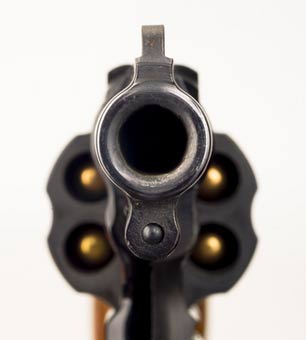Last Thursday, in an unusual and tragic case of “man bites dog,” psychiatrist Lee Silverman shot a patient in a Philadelphia area clinic. The patient, Richard Plotts, had just killed Theresa Hunt, a caseworker who had accompanied him to his appointment with the doctor. The discrepancy between what we hope to find in a psychiatrist’s office – a calm and empathic person who practices unconditional positive regard – and the reality of the Darby, Pennsylvania shootings casts light on the unrealistic expectation that psychiatric care can prevent violent crime. The patient murdered his case worker. His doctor took him down.
The psychiatrist and the violent criminal make strange, but frequent bedfellows. A US Department of Justice survey found that the rate of nonfatal, job-related violent crime for psychiatrists and mental health professionals was over five times that of workers in all occupations. Yet many experts have noted that the severely mentally ill patient is rarely violent, and that violent people are rarely severely mentally ill.
Most violent crime is committed by sociopaths, not schizophrenics. Richard Plotts had a history of multiple arrests for violent crimes and gun charges. Mental health treatment offers little to the antisocial patient. Nonetheless, such patients are frequently found in mental health settings because they have symptoms associated with severe mental illness, symptoms like irritability, paranoid ideation, suicidal and homicidal thoughts and poor impulse control. A patient recently released from jail may be homeless and broke. He may use cocaine or other drugs, which make him jittery and depressed. He has alienated his family and may not even be tolerated in a homeless shelter. In this state, he comes to the attention of the psychiatrist.
Unfortunately, the psychiatrist may be unable to help. Psychiatrists can offer consultation, medication, psychotherapy and hospitalization. None is of any use to the antisocial patient, who is famously untreatable. He needs social support, food, and money, but has a habit of devaluing and destroying everything he sees. The sociopath cannot accept goodness. It is too painful a reminder of the good things that he has lost; in particular, the love of his parents. If the sociopath accepted a doctor’s or caseworker’s kindness, he would be forced to confront the way his parents, who should have been good to him, were not good enough.
The mental health system is just another source of disappointment for the sociopath. The psychiatrist personifies his hopelessness, as nothing he has to offer is worthwhile. The case worker can only do so much for a client who scorns her help and destroys whatever she can provide, and she becomes another object of the sociopath’s rage.
Is the bottomless need and hatred expressed by the sociopath actually a psychiatric syndrome? Again, most violent acts are not committed by the mentally ill. The danger in medicalizing antisocial behavior is that it lets everybody but doctor and patient off the hook. The idea that criminals belong in the psychiatrist’s office is part of our culture’s denial that widespread social change is needed to prevent violent behavior. Our violence problem is too pervasive and consequential to be resolved by two people alone in a room.
At the Darby clinic, a psychiatrist carried and fired a gun to protect himself and others from a patient, who had just shot a caseworker to death at point-blank range. When psychiatrists and patients bring guns to appointments, it is clear that mental health treatment is not the answer to violence prevention. We need to understand that antisocial behavior does not constitute mental illness, and that the medical encounter cannot be expected to contain it.
